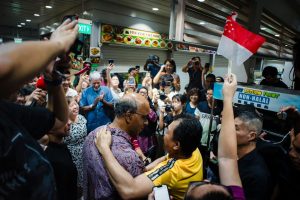In the recent Singapore presidential election, Tharman Shanmugaratnam, an elder statesman, international figure, and establishment candidate, secured a record popular vote, prompting some Western analysts to interpret the result as a sign of Singaporeans’ trust and confidence in the ruling People’s Action Party (PAP).
However, this election was not an endorsement of the ruling party, which is suffering a slew of scandals involving some of its highest-ranking and ministerial-level leaders.
Singapore’s presidency is unique, as it combines ceremonial duties as the head of state with the functions of being the safeguard for the national reserves and the integrity of the Public Service Commission. The latter two functions were introduced by Lee Kuan Yew after a 13 percent swing against the PAP during the 1984 general election. In doing so, Lee sought to prevent any potential mismanagement of the national reserves by an inexperienced non-PAP government through a “freak” election result. The strict eligibility criteria for presidential candidates ensure that even if the PAP were to one day lose its parliamentary majority, control over the national reserves remains firmly in the hands of the ruling party.
The eligibility criteria for presidential candidates effectively limit the pool to individuals with private sector experience or public sector experience. Private sector candidates are rare, leaving Singaporeans typically choosing between candidates from the public sector. These candidates are limited to individuals who have held positions such as ministers and speakers of Parliament. Historically, these roles have been occupied by PAP members or individuals appointed by the PAP.
In fact, no non-PAP ministers or speakers of Parliament exist in Singapore today. Consequently, every elected Singaporean president since 1993, with one exception, has been a former PAP minister or speaker of Parliament. The dominance of the PAP in these key positions underscores the party’s control over the presidency.
Looking closely at the nuances of this election, there are three key reasons why Tharman’s win does not equate to a resounding PAP mandate.
First, Tharman’s personal popularity among voters transcends party lines. With over two decades of experience as a PAP minister, he is arguably the most popular member of the party. Even during periods when the PAP’s voter share diminished since 2011, Tharman consistently commanded a strong majority in parliamentary elections. A 2016 survey indicated that 69 percent of Singaporeans would support him as Singapore’s next prime minister, highlighting his broad appeal. Intriguingly, only 10 percent expressed a preference for Deputy Prime Minister Lawrence Wong, the PAP’s current heir apparent.
Tharman’s reputation extends beyond Singapore’s borders, positioning him as an international statesman known for his economic and diplomatic acumen. Therefore, Tharman’s personal popularity played a significant role in his electoral success, but it does not necessarily translate into unwavering support for the ruling party.
Second, the eligibility criteria for candidates limited Tharman’s competition, leaving him facing lesser-known contenders. While Tharman had over two decades of public office, the other two candidates in the election were relatively unknown and untested figures in the public eye, despite meeting the eligibility criteria.
Few Singaporeans were familiar with Ng Kok Song, the former chief investment officer of the Government of Singapore Investment Corporation (GIC), the country’s largest sovereign wealth fund, until he announced his presidential bid. Tan Kin Lian, the former CEO of NTUC Income, the insurance branch of Singapore’s national trade union center with a historical relationship with the ruling party, was more recognizable but faced controversy over his statements about women and race. The eligibility criteria favor candidates like Tharman, who have public-facing roles and established track records, which further cemented his win.
Lastly, Singaporeans recognized this election was about selecting the best statesman and gatekeeper of the reserves, rather than serving as a referendum on the PAP’s governance.
While some opposition parties advocated for Tan Kin Lian, the main opposition Workers’ Party (WP) and the smaller Progress Singapore Party (PSP) refrained from fielding or endorsing candidates. The state-owned media emphasised the presidency’s role in safeguarding the nation’s reserves and representing Singapore on the international stage. Tharman’s international reputation and experience as finance minister checked these boxes more than Ng and Tan.
Tharman Shanmugaratnam’s victory in the presidential election represents a win for Singapore as a small nation that punches above its weight, but not a vote of confidence in the ruling People’s Action Party. His performance could be seen as a win for the establishment, who have yet another president from among their ranks, but the PAP knows parliamentary elections are the only true litmus test.
In that context, the decision to refrain from calling a by-election to fill the three vacant PAP seats left by Tharman and the resignations of former Speaker of Parliament Tan Chuan Jin and PAP MP Cheng Li Hui for having an inappropriate relationship reflects an acknowledgment that Singaporeans will likely vote against the PAP, further underscoring the distinction between Tharman’s personal appeal and party support.
Tharman will discharge his duties with wit, decorum, and the situational awareness a president should encompass in representing the Singaporean brand on the global stage. Tharman will serve Singaporeans well, but his win is not a vote of confidence for the ruling party.

































